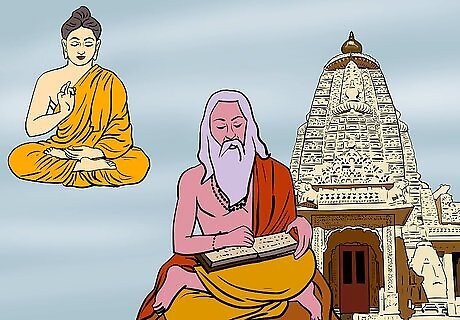
views

Begin with a general overview of Indian philosophy. Indian philosophy is a rich and diverse tradition that encompasses a wide range of thought systems developed on the Indian subcontinent over thousands of years. There are 2 broad divergences in the different schools of thought present under the umbrella term of Indian philosophy, one being the orthodox school of thought (which believes in the concept of Vedas), and the unorthodox school of thought (which does not believe in the concept of Vedas).

Understand the major schools of Indian philosophy. There are 6 main orthodox schools of thought and 3 main unorthodox schools. Buddhism and Jainism, which are different religions altogether, follow the Buddhist and Jain schools of thought, different from the orthodox schools of thought that Hindus generally follow.

Understand the central texts in Indian philosophy. For the orthodox schools of thought, The Vedas should be given the utmost importance. Apart from these, there are a lot of philosophical tidbits present in the Hindu epics such as Ramayana and Mahabharata as well. Consider reading them for a much more comprehensive understanding. Reading all of the texts is not necessary, and not even possible at this stage. Gain a brief understanding of the different texts and the vast nature of this subject.

Read the writings of Adi-Shankaracharya. Adi Shankaracharya is considered to be one of the greatest philosophical scholars originating from India. His text named Vivekachudamani has been written from the perspective of the uninitiated, as he begins to learn about the philosophical texts through his "guru" or master. It is a great starting point for gaining some preliminary knowledge about Indian philosophy.

Examine some of the many books available on other old philosophies. This will help provide context and deepen your understanding. The Bhagavad Gita is a good start for getting an in-depth understanding of Indian philosophy. The Bhagavad Gita is considered to be the fifth Veda by many devotees and scholars alike and also explains the intricacies of different philosophies such as the Samkhya philosophy in great detail.

Understand the depth of Indian philosophy. It is vast beyond the imagination of many Western people. There are 6 main schools of thought in the Vedantic perspective alone, ranging from the Mimamsa school of thought, to the Vaisheshika school of thought. Dive into each school of thought one at a time, as it is vast, and stay consistent in your journey of increasing your knowledge!

Form a Community for Discussion. Forming a community interested in discussing the metaphysical interpretations of the different verses present in texts such as the Mandukya Upanishad or Bhagavad Gita can be helpful when trying to gain an in-depth understanding of the different verses. This step, however, should be done after a preliminary understanding of the subject, as direct discussions without some previous academic exploration can lead to misinterpretations.




















Comments
0 comment